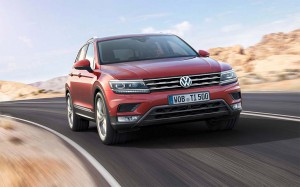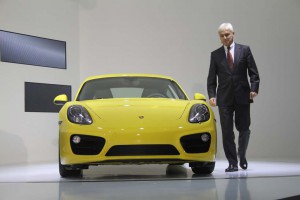Nearly three months after it was revealed that the German automaker had cheated on diesel emissions testing, Volkswagen is beginning to truly feel the impact of the scandal – and the situation is only likely to get worse for some time to come.
U.S. sales by the Volkswagen brand tumbled by a 24.7% last month, in large part due to a stop-sale of all its diesel models. A federal judicial panel will this week decide how to handle the more than 300 lawsuits already filed against the automaker in the wake of the scandal. And VW has lined up a $21 billion bridge loan it may need to cover the costs it’s expected to incur.
But at least VW workers have gotten some good news, the families controlling the automaker telling employees at Wolfsburg headquarters they want to protect jobs despite planned cuts in capital spending.
The Volkswagen brand was one of the few to report a sales decline during a November that came close to delivering an all-time record for the U.S. auto industry overall. Significantly, the 24.7% downturn roughly matches the typical share of VW sales made up by its various diesel models.
(For more on November car sales, Click Here.)
For now, products like the Golf TDI are on lockdown after the maker admitted using a so-called “defeat device” on its 2.0-liter turbodiesel to pass emissions tests. Late last month, company officials acknowledged they also illegally modified models equipped with the bigger 3.0-liter TDI engine. That has led to a stop-sale on products including the Touareg diesel, as well as some Audi and Porsche vehicles.
So far, VW has maintained production and employment levels at various plants, including one in Chattanooga, Tennessee now in the midst of a major expansion to handle new crossover models. But if the sales decline continues, industry analysts warn cutbacks are likely.
And declining sales would be only one factor. Two weeks ago, Volkswagen AG CEO Matthias Mueller announced the maker would slash capital spending by $1.1 billion, or nearly 8%, adding that “We will strictly prioritize all planned investments and expenditures. As announced, anything that is not absolutely necessary will be cancelled or postponed.”
(For more on Volkswagen’s planned spending cuts, Click Here.)
At least one model, a new version of the big VW Phaeton, was delayed, as were several plant projects. Other cuts could follow, according to reports out of Germany.
That has led to growing concerns among Volkswagen employees, as well as officials in Wolfsburg, the once-sleepy German town that has grown over the decades by riding VW’s success. Roughly half of its residents are directly employed through the automaker.
But members of Porsche and Piech families, who together own a controlling stake in VWAG, tried to downplay such fears today during a rally attended by 20,000 employees at the main VW plant in Wolfsburg.
“Jobs are a very valuable asset,” said Wolfgang Porsche, the chairman of Porsche Automobil Holding SE, which holds a majority stake in VW. “This asset mustn’t be squandered.”
A critical question remains: how much will the diesel cheating scandal ultimately cost?
The U.S. Environmental Protection Agency could fine the maker as much as $18 billion for cheating on the 2.0-liter diesel, and $3.2 billion more for skirting regulations with the 3.0-liter engine. An ongoing criminal investigation by the Department of Justice could add to that figure.
At least on paper, VW could be facing even bigger costs were the courts to accept the claims made in over 350 separate lawsuits filed since the scandal began. A multi-district judicial panel will meet this week to decide how and where to hear those suits, with both VW and the DoJ asking for a courtroom in Detroit.
(For more on the move to consolidate the many VW lawsuits, Click Here.)
VW could face more financial problems abroad. Only 482,000 of the 11 million 2.0-liter diesel vehicles it admitted rigging were actually sold in the U.S., after all. There are at least two ongoing criminal investigations in Germany alone, and plenty more civil suits have been filed worldwide.
Some estimates have run into the tens of billions of dollars for VW to eventually work through the diesel scandal. A report by the Reuter’s news service on Wednesday said the maker has lined up a bridge loan of 20 billion euros, or about $21.2 billion, to provide it a cash cushion.
Meanwhile, VW is also facing an investigation in the U.S. exploring the possibility it lied to U.S. regulators about the safety record of its products. If it did, the carmaker could face still more fines.
“They are facing a lot of challenges right now,” said Kelley Blue Book analyst Tim Fleming. “It seems like one scandal after another and it just seems to be getting worse.”
Surprisingly, after a heavy sell-off during the first two months after the diesel cheating scandal was revealed, investors seem to be ready to return. The share price plunged from $169.65 on September 16th, the day before the EPA made its first revelation, to a low of $92.36 on October 2nd. It has rebounded to the $125 to $130 a share range in recent days.
Whether investors will now stick around for a bumpy ride or will flee again with more bad news is far from certain.



What no one has explained to the public is why the U.S. is the only country trying to persecute VW for such a trivial violation of emissions regs that appears to have been perpetuated by a small group of 10-30 people within VW, as determined by two independent investigation teams. Other countries have mandated that VW recall and update the ECU software and pay some modest fine for what appears to be a rogue group of engineers and programmers responsible for the EA 189 series four cyl. diesel engines. The Audi designed and developed 3.0L V-6 diesel engines have no “defeat device” or other illegal software as determined by independent governmental emissions engineers at the German motor authority KBA and elsewhere, which is contrary to the EPAs unproven allegations. Some observers believe that there could be coercion to get VW to admit to violations in the 3.0L engines V-6 diesel engines that simply don’t exist, so the EPA can save face for not recognizing an industry standard CAT cleaning cycle.
It’s interesting to note that the media is now just starting to comprehend the serious personal financial impact to VW employees and others who had absolutely nothing to do with the emissions violations which in themselves amount to literally nothing more than a minute statistical excess exhaust emissions that is corrected with a software update and a $11 part for the 1.6L EA 189 four cyl. series diesel engines.
If VW as a corporation had no knowledge of this emissions issue it’s absurd to persecute them and impose massive financial damage to all concerned for this violation. Hold those accountable who violated law. Fine VW appropriately but let’s not lose track of reality. When one understands the impact of the fines and litigation vs. any perceived damage, it’s clear the U.S. is the only country over reacting to this trivial matter.
Within weeks of the EPA’s diesel engine violations announcement VW cut the entire third shift at their engine production plant in Salzgitter, Germany which produces in excess of 7,000 various engine models per day. This is the largest engine factory under one roof in the world. As soon as this happened component suppliers to VW had to cut their production and lay off employees. These layoffs have turned many people’s world upside down – over such a trivial issue that they had nothing to do with. And the financial impact to innocent people including some in the U.S. is snowballing weekly.
Investors, car dealers and all who depend on VW’s products being sold have suffered significantly even though they had nothing to do with the VW scandal. Employees at Audi and Porsche and their distribution system, transport lines from Europe to the U.S. and many other entities will suffer serious financial losses from this unprecedented action against VW. People in Europe can not understand why the U.S. is out to persecute VW over this minor issue. Many in the U.S. who actually understand the technical issues have been asking why the EPA is on a mission to destroy VW. Why have 300 U.S. lawsuits been filed against VW for such a trivial matter when consumers received better performance than they actually paid for? We didn’t see NHTSA threated to fine GM for 100+ deaths with a clear ignition defect issue that apparently was covered up by at least some mid-level management. While there have been lawsuits filed against GM we don’t see states filing multiple class action lawsuits against GM over the defective ignition switches that resulted in the deaths of 100+ people. We don’t see anyone in the U.S. looking to put GM out of business over a defective ignition switch even though over a hundred deaths have been related to the defective ignition switch.
Why is everyone in the U.S. looking to cash in on the VW diesel emission scandal? We all know that the gold diggers crawl out from under rocks when there is any opportunity to steal from someone else but the U.S. is looking for all the world to be a unscrupulous entity on a mission to destroy VW over a minor violation of emissions laws. It simply does not add up and finally people are starting to ask why is the U.S. persecuting VW over this trivial matter? The personal devastation to innocent people is completely unjustified but as real as a heart attach. It’s time for those responsible to justify the witch hunt against VW?
Actually, GT, the Germans have been equally aggressive and have more separate criminal investigations underway, a second one looking into tax fraud.
Paul E.
Yes they have conducted investigations and the German motor authority KBA has cleared the VW 3.0L V6 diesel and mandated a 2.4 million recall of the EA 189 series engines to replace the software. The KBA have not however threatened VW with billions of dollars in fines. They want the engines to comply with regulations. The KBA is investigating ALL VW gas and diesel engines to be sure they all comply with regulations but they are not posturing to put VW out of business or impose so much financial damage to VW and the associated auto suppliers as to cause serious economic damage as the EPA is proposing.
The German tax fraud issue is due to the minute mpg/CO issue on the 1.4L gas engine. The fine will be insignificant compared to what the EPA is suggesting.
There is a huge difference between proper investigation, mandated recalls, software updates vs. the EPA imposing irrational fines for these trivial emissions violations, especially if senior VW/Audi/Porsche management were not part of the illegal software issue. The EU is reacting appropriately and responsibly while the EPA clearly is out for blood and to make this in to a huge financial gain for the EPA at a cost world wide to VW, Audi, Porsche, their car owners, investors, suppliers to VW, etc. We’re talking dramatically unjustified economic damage over a trivial emissions violation. Compare the VW deal to the defective GM ignition switch with over 100 deaths and it’s obvious the EPA is acting completely irrational in the VW incident.
As I said Europe is asking why the U.S. is out to destroy VW. The difference in perception of a minor exhaust emissions and software issue is not viewed elsewhere as a mass murder of a million people as you’d think was the case with the way the EPA is acting and the 300+ U.S. lawsuits. There has never in history been this many gold diggers piling on in hopes of getting free money from VW that they are not entitled to.